Film Commentary: “Greetings from Tim Buckley” and the Demands of the Rock Biopic
The best rock biopics, like 24 Hour Party People, I’m Not There, and The Doors, aren’t afraid to get a little weird, even if it means throwing verifiable facts to the wind.
There are no current screenings of Greetings from Tim Buckley in the New England area. However, the film is available to watch right now through iTunes, Amazon, and Vudu.
By Adam Ellsworth
Biopics are not documentaries.
Documentaries, in theory anyway, tell the truth, the whole truth, and nothing but the truth. In practice, they often only tell the version of the truth that the director is interested in propagating, but still, and at the very least, making stuff up is frowned upon.
Biopics, on the other hand, often invent scenes, characters, and dialogue. They shuffle chronology, tie up loose ends, and add drama where drama is lacking. Biopics aim for larger truths, or at least a sexier story that will lead to a better opening weekend. This is generally expected and accepted.
Ray is a biopic. Walk the Line is a biopic. The Buddy Holly Story is a biopic.
And Greetings from Tim Buckley is a biopic.
So no, it didn’t all happen just the way the movie says it did. “It” being the time Jeff Buckley spent in New York City preparing for, and participating in, a tribute concert for the father he never knew, a semi-famous folk/jazz singer/songwriter named Tim Buckley.
Of course that doesn’t mean director Daniel Algrant and screenwriters David Brendel and Emma Sheanshang throw the facts completely out the window.
There really was a tribute concert in New York City in 1991 at St. Ann & The Holy Trinity, and it really was called “Greetings from Tim Buckley.” A then still unknown Jeff Buckley really did perform at it, and he really did steal the show.
Moreover, the concert really was the first time Jeff was paired up with soon-to-be collaborator Gary Lucas, a musical partnership that would yield huge dividends in the future. The concert really was led by “producer and hipster-about-town” Hal Willner (as he’s described in David Browne’s 2001 book, Dream Brother: The Lives & Music of Jeff & Tim Buckley), and the concert really did feature, among others, the great Richard Hell, who is played wonderfully in Greetings from Tim Buckley by Frank Bello of the band Anthrax.
There are certainly other facts that the film gets right, but those are the big ones. It would be silly to point out every little detail that’s off or every scene that was invented, as again, Greetings from Tim Buckley is a biopic, and in biopics invention is par for the course.
“Invention” seems too strong, though. The better term would be “creative license.”
So one invention, er, use of creative license, in Greetings from Tim Buckley that should be brought to light, if only because its existence is so vital to the film, is that the character of Allie, played very well indeed by British actress Imogen Poots, did not actually exist.
In Greetings from Tim Buckley, Jeff Buckley shows up at St. Ann’s after a flight from his home in California, meets a lot of people who say “You look just like your father!” (that truly was many people’s reaction at the real life tribute concert), and then he sees Allie, who is an assistant to the folks running the show. Jeff is smitten, and the two of them go around the city together, visit at least one record store, and over the next few days have many deep conversations and semi-adventures.
Well, again, “Allie” didn’t exist in real life. However, that doesn’t mean that Allie isn’t based on somebody else.
Jeff really did meet someone at the rehearsals for the tribute concert. Her name was (and still is) Rebecca Moore, and she and Jeff would go on to have a serious relationship and even live together for a time. How many, if any, of the movie’s scenes between Jeff and Allie actually took place between Jeff and Rebecca is tough to say, but if the over/under is 1.5, the safe money is probably on the under.
These aren’t the very best scenes in the movie, but at least they’re aiming at something different and interesting. If anything, the filmmakers don’t do enough with these scenes, or have enough of them for that matter. That is, they don’t use enough creative license. That’s the biggest problem with Greetings from Tim Buckley. It isn’t nearly inventive enough, and as a result, it’s pretty boring.
The best rock biopics, like 24 Hour Party People, I’m Not There, and The Doors, aren’t afraid to get a little weird, even if it means throwing verifiable facts to the wind. These movies know that facts are for documentaries and history books. The films don’t lie or try to pull the wool over the eyes of the audience. They just give a wink and a nod and say, “Well, it could have happened like this.” When these movies are really humming, they give a wink and a nod and say, “Okay, obviously this didn’t happen, but wouldn’t it be cool if it did?”
Not everyone who has their story depicted this way is happy about it. In 1998, Doors’ organ player Ray Manzarek published Light My Fire: My Life With The Doors, but he should have called it Oliver Stone is a Fascist: Why The Movie The Doors Is All Wrong. Manzarek doesn’t just try to set the record straight in his book (which would have been understandable), he froths at the mouth every time the movie, or Oliver Stone, comes up. It can make for some uncomfortable reading.
Lindsay Reade, co-author of the book Torn Apart: The Life of Ian Curtis, takes a more sensible approach to rock biopics and what they’re all about. As the ex-wife of former Granada TV presenter and head of Factory Records (home to Joy Division) Tony Wilson, Reade has been depicted on screen in two movies, Control and 24 Hour Party People. 2007’s Control is a beautifully shot movie (it was the first feature film directed by well-known rock photographer Anton Corbijn), in which Sam Riley plays Ian Curtis, the late, troubled lead singer of Joy Division. It’s a haunting movie for sure. It stays pretty close to the “facts,” and Riley is good (though not great) as Curtis. But the whole isn’t greater than the sum of its parts.
On the other hand, 24 Hour Party People, released in 2002, is a riot from beginning to end. It consistently breaks the fourth wall, as Steve Coogan, playing Tony Wilson, speaks directly to the viewer and says things like (after a TV news hang gliding stunt gone bad), “You’re going to be seeing a lot more of that sort of thing in the film. Although that actually did happen, obviously it’s symbolic, it works on both levels. I don’t want to tell you too much, don’t want to spoil the film. I’ll just say, ‘Icarus.’ If you know what I mean, great. If you don’t, it doesn’t matter. But you should probably read more.” So how much of the movie is actually true? Well, what does “true” really mean anyway? And how does it compare with Control, a film that tells a similar story featuring many of the same characters?
“Whereas 24 Hour Party People may have been, as Tony once remarked, ‘a collection of lies that manages to tell the truth,’ Control was, in my opinion, more a collection of truths that somehow told a lie,” is the way Lindsay Reade put it her Afterword to Torn Apart.
That pretty much sums up all rock biopics. The more outrageous the better. And the less factual, the more true.
Is it any surprise then that many filmmakers who tackle the subject of rock and roll forgo the biopic route all together and make movies that are presented as fiction? Almost Famous is one of the great movies of the twenty-first century, and while it’s certainly based on writer/director Cameron Crowe’s experiences as a teenage rock writer, it is not Cameron Crowe’s biopic. It’s fiction! And it never claims to be anything else.
There’s a buzz building around the upcoming Coen brothers’ film Inside Llewyn Davis. The film is alleged to be based on the life of Dave Van Ronk, a fixture of the 1960s Greenwich Village folk scene, and a truly great musician. Van Ronk released an album titled Inside Dave Van Ronk in 1963, so there’s obviously some connection between the real man and this fictional Llewyn Davis character. Still, the Coen’s are smart to go the route they’re going. Van Ronk was an immensely talented and interesting guy, but it would be impossible to bring his or any other musician’s life to the screen exactly as it happened. The closer they got to getting it right, the more boring a movie it would probably be, and Van Ronk certainly was not boring.
There are many more examples but none better than This is Spinal Tap. The 1984 movie is often described as a “mockumentary,” but it’s maybe the truest movie ever made about rock and roll. “Spinal Tap,” U2’s The Edge says during the 2008 documentary It Might Get Loud, “That’s a movie I watched. I didn’t laugh. I wept. It was so close to the truth.”
When filmmakers aren’t prepared to just make the whole thing up, or at least take the “facts” and bend them until they snap in half, rock and roll movies aren’t very interesting. Take the aforementioned Ray, Walk the Line, and The Buddy Holly Story. All of these movies feature timeless music and truly great performances, but none of them are classic films in their own right. The Buddy Holly Story is probably the best of the bunch, and when it comes to the facts, that movie is a mess.
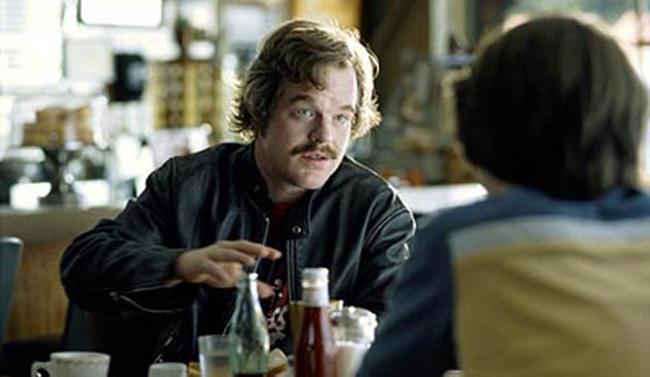
Philip Seymour Hoffman as Lester Bangs in ALMOST FAMOUS — one of the great movies of the 21st century.
Greetings from Tim Buckley ultimately suffers the same fate. Penn Badgley, best known for his work on the TV show Gossip Girl, gives a solid performance as Jeff Buckley. He certainly looks like Jeff Buckley, or more accurately, he looks like the Jeff Buckley the world came to know in the mid-‘90s. He looks less like the guy with the mop on his head that actually performed at the “Greetings from Tim Buckley” concert in 1991, but no matter. The more creative license taken the better.
Badgley also sounds like Jeff Buckley, which is no small feat. Mimicry is of course not the same as performance, but there’s something satisfyingly meta about Badgley doing Jeff Buckley doing Tim Buckley.
At times, it might seem like Badgley is taking his portrayal a little over the top, but that’s more the fault of the script, not to mention the fact that Jeff, in real life, could be a bit dramatic. Still, watching a moody Badgley as Buckley brood about his daddy-issues, no matter how real they were, gets tiring. Unfortunately, Jeff Buckley’s daddy-issues are the whole point of Greetings from Tim Buckley. Take them away and you aren’t left with much else, or at least not much else the film has any interest exploring.
There was of course so much more the filmmakers could have done. Like delve into Jeff’s search for a musical voice of his own in the years before the tribute concert or Tim’s own fascinating musical evolution. The film is filled with flashback scenes of Tim on the road while his soon-to-be ex-wife is pregnant with Jeff. These flashbacks are much too fleeting. They hint at what must have been going through Tim’s mind at the time, the guilt and the confusion, but hints are all we’re given. Plus, Tim was a touring musician in the ‘60s. You don’t need to rely on clichés and drug hazes to make that life seem interesting on screen, but as the movies stands, the Tim parts never go anywhere.
And why did the filmmakers feel the need to have the whole film revolve around the “Greetings from Tim Buckley” concert anyway? It was, undoubtedly, a very important turning point in the life and career of Jeff Buckley, but it could have just as easily been the climax, or framing, for another, deeper film. If the filmmakers felt that the concert was so important that it needed its own movie, they should have given even more time to the other, non-Buckley characters. It’s not like they couldn’t have made this interesting. One of their characters is Richard Hell! (By the way, Richard Hell’s recently published autobiography I Dreamed I was a Very Clean Tramp is recommended.)
As the filmmakers were obviously not willing to take Greetings from Tim Buckley in any off-the-wall (or at least interesting) directions, the film is at its best when it sticks to the music. Whether it’s Jeff and Allie hanging out in a record store and Jeff rapturously singing a medley of Led Zeppelin III songs (it’s doubtful that this ever happened but, given Jeff’s love of Zeppelin, it could have happened, and that’s why it’s such a great, and “true,” scene) or it’s Jeff onstage performing the music of his father, when the narrative goes away, we’re reminded why we’re watching this movie in the first place: Tim and Jeff Buckley made really great music. That’s what’s important. The “facts” of their stories are not.
Adam Ellsworth is a writer, journalist, and amateur professional rock and roll historian. His writing on rock music has appeared on the websites YNE Magazine, KevChino.com, Online Music Reviews, and Metronome Review. His non-rock writing has appeared in the Worcester Telegram and Gazette, on Wakefield Patch, and elsewhere. Adam has an MS in journalism from Boston University and a BA in literature from American University. He grew up in Western Massachusetts, and currently lives with his wife in a suburb of Boston. You can follow Adam on Twitter @adamlz24.
Tagged: 24 Hour Party People, Greetings From Tim Buckley, I’m Not There, rock biopic, The Doors

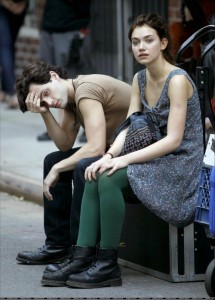
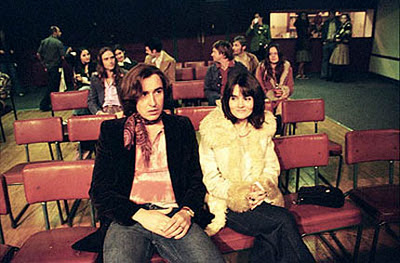
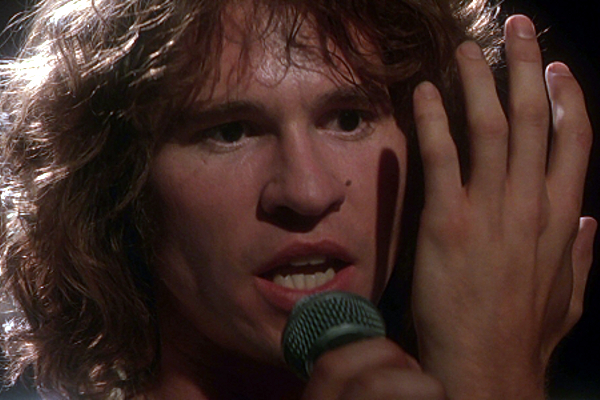
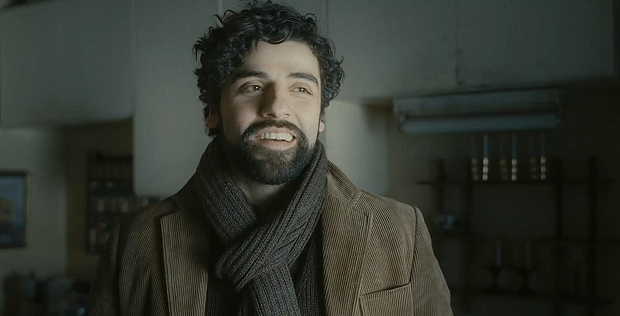
For those of you who loved this so much that you actually went down to the comments section (which, I assume, is all of you), as a total and somewhat mindblowing coincidence, 24 Hour Party People, Control, and I’m Not There, all of which are mentioned in the above, will be showing over the next 5 or 6 days on the Sundance channel. Check your local listings…